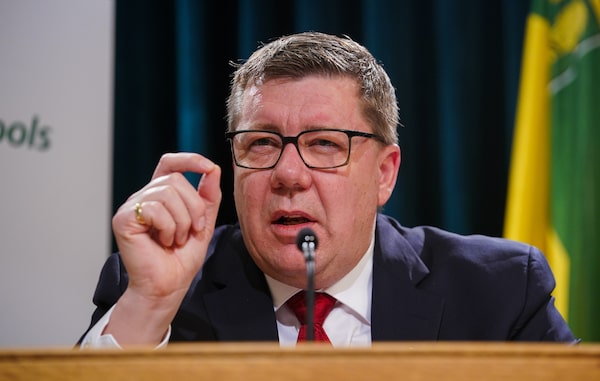
Saskatchewan Premier Scott Moe speaks during a news conference in Regina, on March 20.Heywood Yu/The Canadian Press
There was a time, just earlier this year, when Premier Scott Moe’s government acknowledged it was breaking the law.
Now, that messaging has drastically changed.
Mr. Moe’s governing Saskatchewan Party decided not to collect or remit carbon levies on home heating owed to Ottawa. It was an act of protest, because the federal Liberals exempted home heating oil from carbon pricing to hold onto votes in Atlantic Canada, but didn’t do the same for other types of fuels – namely, natural gas – commonly used in other parts of the country.
You could certainly take issue with Saskatchewan’s strategy. But there was a logic to it. The Liberals sullied their carbon-pricing system with the clumsy political manoeuvring of the exemption. Saskatchewan’s stance was, and is, that the policy was deeply unfair.
Mr. Moe appeared willing to bear the fallout, even getting the Canada Revenue Agency to allow politicians to be responsible for the malfeasance instead of public servants. He told The Canadian Press in December: “It’s unfortunate that there will be a violation of federal law.” The provincial Minister in charge of Crown corporations, Dustin Duncan, said in March: “We recognize that this may come with consequences.”
But in recent days, the messaging from Mr. Moe has changed. He’s now saying his government’s actions might be lawful and there are no dollars owed.
“We feel that we very well might be in compliance with the law to date,” Mr. Moe said in an interview with The Globe and Mail this week.
And it should be noted: This messaging changed shortly after the taxman came calling, several weeks ago. The Canada Revenue Agency is now auditing Saskatchewan for not paying those carbon levies on home heating.
This new argument from the Saskatchewan government is far less coherent, and it’s likely to send the provincial and federal governments back to court. As the CRA goes through its process, Mr. Moe said it’s possible the unpopular Liberal government will be punted from office – replaced with a Conservative government that promises to “axe the tax” – before the audit is resolved.
“That could be one of the consequences,” the Premier acknowledged. “If this federal government continues to refuse to make those changes, we will be looking for a new administration to make those changes.”
Prime Minister Justin Trudeau has warned that the CRA is “very, very good” at getting money owed. He wished Mr. Moe a sarcastic, “Good luck with that.”
In response, the Saskatchewan Premier told The Globe his province’s taxes are paid “in full.” If Mr. Trudeau “thinks differently, he’ll have to show his work.”
The news of this messaging shift from Mr. Moe went by with barely a ripple – perhaps because there is fatigue when it comes to every twist and turn in the fight over the Liberals’ embattled carbon pricing policy. But the story plods along, still unresolved.
Mr. Moe isn’t laying out his whole legal strategy, but he said the question of carbon pricing could end up in court again. He believes that the two key arguments that led the Supreme Court of Canada to rule in 2021 that Ottawa has the authority to impose a minimum price on greenhouse-gas emissions across the country are falling down.
First, said Mr. Moe, the levy is not being applied fairly, even though Ottawa won by arguing its Greenhouse Gas Pollution Pricing Act was a backstop to ensure minimum carbon pricing across the country.
“We’ve mirrored the federal government’s decision,” Mr. Moe said, adding his province is going “to pay exactly the same amount of carbon tax on how we heat our homes as Atlantic Canadians are.”
And secondly, the carbon levy is now being collected as if it’s a tax, whereas the Supreme Court concluded the fuel and emission levies were constitutionally valid regulatory charges, and not taxes.
Eric Adams, who teaches Canadian constitutional law at the University of Alberta, said it would be possible for a province to seek a new reference case, based on the argument that the constitutionality has been lost via Ottawa’s administration of the pollution pricing law. However, there were always carveouts allowed.
The second argument, that the levy is not a tax, “might be too clever by half,” Prof. Adams said. “You don’t lose constitutional validity in legislation based on the administrative branch of government that’s engaged.” He doesn’t believe either legal argument would be likely to succeed.
In the argument for carbon pricing fairness, Mr. Moe has ground to stand on. When it comes to the legal challenges outlined here, however, his government’s position is far shakier.